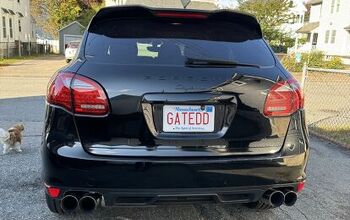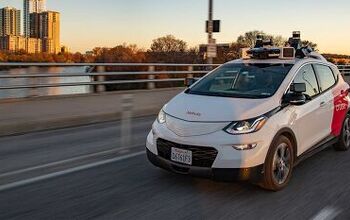Trade War Watch: American-Made Mercedes-Benz SUVs Held Up at Chinese Ports Over 'Safety Risk'

Mercedes-Benz sport-utility vehicles assembled in Tuscaloosa, Alabama, are being checked for potential problems by Chinese customs authorities in Shanghai, according to the nation’s media. The situation was later confirmed by Daimler AG on Thursday.
Officially, custom agents discovered the imported GLE and GLS models possess “insufficient” rear brakes and pose a safety risk. However, this isn’t China’s first time holding up product from the Tuscaloosa factory. Daimler confirmed that its American-made SUVs, along with vehicles from Ford, were held up for several weeks in late April.
According to Reuters, a China-based Ford executive said the company was being asked to perform additional checks on emission components. Meanwhile, a second unnamed industry official said China subjected BMW and Daimler to similar delays. BMW later denied the claims, however.
“Customs pretends there are technical non-conformities of some nature that won’t allow them to clear these U.S.-made cars through customs, but the U.S.-China trade frictions must be the background to this,” the official said. “Although no one will officially admit it.”
Japanese and German vehicles built outside the United States aren’t facing similar delays at Chinese ports. While this may be indicative of nothing, the holdup of American goods extends beyond the automotive realm and seems to coincide with periods of particularly aggressive trade decisions from the United States. For example, the April customs hold-up took place immediately after President Trump accused China of stealing American technologies through joint-venture requirements and unfair listening practices, all while preparing $150 billion in tariffs on Chinese goods.
The more recent port delay with Mercedes took place as Chinese authorities prepared additional retaliatory tariffs of 25 percent on $16 billion worth of U.S. imports from numerous industries, including automotive.
American-made vehicles are subject to an elevated import tariff of 40 percent, though China kept its promise with the rest of the world and reduced automotive duties to just 15 percent. Last month, this helped raise the number of vehicles imported into the nation from countries other than the United States. Foreign automakers shipped 165,000 vehicles into China through July, breaking the previous record of 134,000 from four years earlier.
“We are working with the relevant authorities to resolve the issue,” a Daimler spokeswoman said on Thursday. The company could not identify the number of vehicles affected but described the situation as an “entirely technical issue.”
The United States has a new 25 percent tariff on $16 billion worth of Chinese goods scheduled for August 23rd, the same day China imposes its import fee of the same amount. We’ll let you know if more American-made vehicles find themselves in need of additional safety checks at Chinese ports.
[Image: Daimler AG]

A staunch consumer advocate tracking industry trends and regulation. Before joining TTAC, Matt spent a decade working for marketing and research firms based in NYC. Clients included several of the world’s largest automakers, global tire brands, and aftermarket part suppliers. Dissatisfied with the corporate world and resentful of having to wear suits everyday, he pivoted to writing about cars. Since then, that man has become an ardent supporter of the right-to-repair movement, been interviewed on the auto industry by national radio broadcasts, driven more rental cars than anyone ever should, participated in amateur rallying events, and received the requisite minimum training as sanctioned by the SCCA. Handy with a wrench, Matt grew up surrounded by Detroit auto workers and managed to get a pizza delivery job before he was legally eligible. He later found himself driving box trucks through Manhattan, guaranteeing future sympathy for actual truckers. He continues to conduct research pertaining to the automotive sector as an independent contractor and has since moved back to his native Michigan, closer to where the cars are born. A contrarian, Matt claims to prefer understeer — stating that front and all-wheel drive vehicles cater best to his driving style.
More by Matt Posky
Latest Car Reviews
Read moreLatest Product Reviews
Read moreRecent Comments
- Carguy949 You point out that Rivian and Tesla lack hybrids to “bring home the bacon”, but I would clarify that Tesla currently makes a profit while Rivian doesn’t.
- Cprescott I'm sure this won't matter to the millions of deceived Honduh owners who think the company that once prided itself on quality has somehow slipped in the real world. Same for Toyoduhs. Resting on our Laurel's - Oh, what a feeling!
- Jrhurren I had this happen numerous times with my former Accord. It usually occurred when on a slow right curve in the road. Somehow the system would get confused and think the opposite lane (oncoming traffic) was an impending head-on collision.
- Cprescott The Ford Shamaro is ugly, thick bodied, and a Mustang pretender.
- Analoggrotto Speaking of mud, does anyone here enjoy naked mud wrestling?

































Comments
Join the conversation
Drop the nuclear weapon on China ASAP! That being end Most Favored Nation (MFN) status for them. They'll come crawling back to the negotiating table quicker than farts leave a fan factory.
"Chinese officials concerned about safety" A-HA-HA-HA-HA-HAH! oooooh... A-HA-HA-HA-HA-HA! oh... heh-heh... A-HA-HA-HA-HA! *slaps knee*